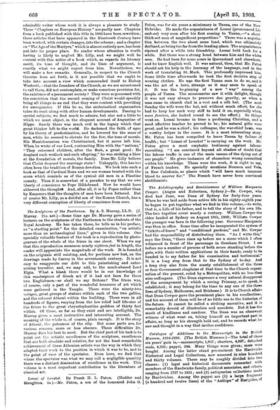Lomai of Lenakel. By Frank H. L. Paton. (Hodder and
Stoughtoa. 6s.)—Mr. Paton, a son of the honoured John G. Paton, was for six years a missionary in • Tanna, one of the New Hebrides. He made the acquaintance of Lomai (pronounced Lo- mah-ee) very soon after his first coming to Tanna,—"a short thick-set man of magnificent proportions." There was a negotia- tion between the two about some land, which was ultimately declined, as being too far from the landing-place. The acquaintance ripened after a while into friendship. Lomai held back for a while. But there was a strong bond between him and the white mon. He had been for some years in Queensland and elsewhere, and he knew English well. It was natural, then, that Mr. Paton should ask his help in the learning of the language, and in the work of translating St. Mark. This profoundly impressed him. Some little time afterwards he took the first decisive step of wearing clothes. He was the first Tanna man to do so, and it was the act of a hero, strange as it may seem to speak of it. It was the be ginning of a new " way" among the people of Tanna. The missionaries saw it with delight, though it was not easy always to preserve due gravity, as when a man came to church clad in a vest and a silk hat. (The next Sunday the wife wore the hat, not without much effort, for she had to keep her neck very stiff to hold it on, especially when, more femineo, she looked round to see the effect.) So things went on. Lomai became in time a professing Christian, and a most effective teacher he proved to be ; his natural gifts were great, and he was a chief ; his colleague, the war-chief Livia, was a worthy helper in the cause. It is a most interesting story. Mr. Paton has been compelled to leave Tanna by failure of health ; but " Lomai of Lenakel " is carrying on the work. Mr. Paton gives a most emphatic testimony against labour- recruiting. "I am convinced beyond all shadow of doubt that the labour traffic is one of the main causes of the dying out of our people." He gives instances of shameless wrong committed within his knowledge. These were the work, it is right to say, of French traders. He specially mentions Noumea and Vela, in New Caledonia, as places which " will have much innocent blood to answer for." The French have never been convinced abolitionists.


























































 Previous page
Previous page